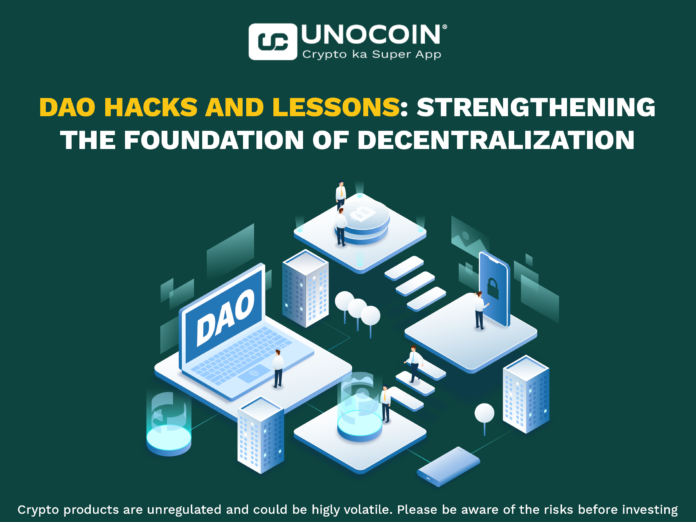Decentralized Autonomous Organizations (DAOs) are gaining prominence as a pioneering model for collective decision-making and governance within blockchain ecosystems. This article delves into the growing influence of DAOs, exploring their power, benefits, and challenges they face.
Creation of the DAO:
DAOs represent a departure from traditional hierarchical governance structures. Born out of an ethos of decentralization, these entities use smart contracts and blockchain technology to enable collective decision-making without the need for centralized authorities. DAOs are designed to be transparent, trustworthy and inclusive, allowing participants to have a direct say in the projects or organizations they are a part of.
DAO Power:
Democratic decision-making:
DAOs allow participants to engage in democratic decision-making processes. Each member typically has voting rights proportional to their stake in the DAO, ensuring a fair representation of interests.
Transparent management:
The transparency inherent in blockchain technology also applies to DAOs. All decisions, transactions and governance rules are recorded on the blockchain, providing a transparent and immutable ledger of actions taken by an organization.
Incentive Alignment:
DAOs often distribute tokens or management assets to participants, aligning their incentives with the organization’s success. This alignment fosters a sense of shared ownership and encourages active participation.
Challenges facing The DAO:
Regulatory uncertainty:
The decentralized nature of DAOs presents challenges in navigating regulatory domains. Regulators are grappling with how to categorize and regulate these entities, leading to uncertainty and potential legal hurdles.
Security risks:
While the use of smart contracts ensures automated and trusted governance, vulnerabilities in these contracts can expose DAOs to security risks. Exploitation or vulnerabilities in the code can lead to financial losses or manipulation of management processes.
Voter turnout and apathy:
Achieving broad participation in DAO decision-making can be challenging. Voter apathy or disengagement can lead to decisions being made by a limited subset of participants, which can impact on the legitimacy of governance processes.
Real-world DAO examples:
DAO (Decentralized Autonomous Organization):
The DAO, one of the first and most famous DAOs, aimed to create a venture capital fund controlled by token holders. However, a vulnerability in its code led to a significant exploit that resulted in the controversial hard fork that spawned Ethereum (ETH) and Ethereum Classic (ETC).
MolochDAO:
MolochDAO focuses on funding Ethereum development projects. It works on the principle of minimizing red tape and allows members to quickly vote on funding proposals. MolochDAO demonstrates the adaptability of DAOs to meet specific needs within the blockchain community.
The future of The DAO:
Despite the problems, the future of The DAO looks promising. Continuous innovation in smart contract technology, increased awareness, and a growing appetite for decentralized governance suggest that DAOs will play an increasingly integral role in blockchain ecosystems.
Conclusion: Navigating the DAO landscape:
Decentralized autonomous organizations redefine management structures and introduce a new paradigm of collective decision-making. The strength of DAOs lies in their ability to promote inclusivity, transparency, and incentive alignment. However, challenges such as regulatory uncertainty and security risks underscore the need for careful navigation.
As DAOs continue to grow, their influence extends beyond the blockchain space and inspires discussions about decentralized governance in broader contexts. Navigating the DAO landscape requires a balance between embracing innovation, addressing challenges, and ensuring that these entities deliver on their promise of democratized and transparent decision-making in the digital age.
Please find the list of authentic Unocoin accounts for all your queries below:
- YouTube Channel: https://www.youtube.com/c/Unocoin/videos
- Newsletter: https://medium.com/subscribe/@Unocoin_growth
- Blogs: https://blog.unocoin.com
- Instagram: https://www.instagram.com/unocoin/
- Twitter: https://twitter.com/Unocoin
- Facebook: https://www.facebook.com/unocoin/
- LinkedIn: https://in.linkedin.com/company/unocoin
- Telegram Group: https://t.me/Unocoin_Group
- Telegram Channel: https://t.me/+fasQhTKBsfA5N2Zl
- Telegram: https://t.me/UnocoinSupport_Bot
- E-mail id: [email protected]
- Contact details: 7788978910 (09:30 AM IST – 06:30 PM, Mon – Sat)
- App store link: https://apps.apple.com/us/app/unocoin/id1030422972?ls=1
- Playstore link: https://play.google.com/store/apps/details?id=com.unocoin.unocoinwallet
Disclaimer: Crypto products are unregulated as of this date in India. They could be highly volatile. At Unocoin, we understand that there is a need to protect consumer interests as this form of trading and investment has risks that consumers may not be aware of. To ensure that consumers who deal in crypto products are not misled, they are advised to DYOR (Do Your Own Research).




![Fundamental Analysis in Crypto [Updated Guide] A Comprehensive Guide to Asset Valuation.png](https://blog.unocoin.com/wp-content/uploads/2024/11/A-Comprehensive-Guide-to-Asset-Valuation-218x150.png)